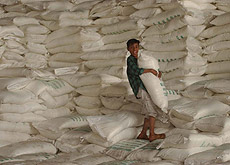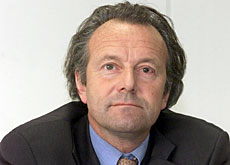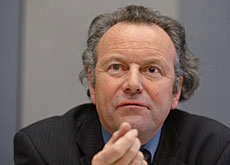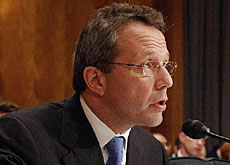Swiss launch probe into oil-for-food scandal

Switzerland has opened an investigation into several persons suspected of illegal dealings in connection with the United Nations oil-for-food programme in Iraq.
The Federal Prosecutor’s Office said on Thursday that those in question were suspected of corruption and money laundering.
“At the centre of the criminal investigation are suspicious flows of money in connection with the oil-for-food programme,” said spokesman Hansjürg Mark Wiedmer, adding that the sums were “considerable”.
Wiedmer said the investigation into passive and active bribery and money laundering was directed at “unknown” parties and at three suspects who had been identified. However, he refused to name them or their firms.
The Prosecutor’s Office has also blocked bank accounts, which may have been used to launder the funds.
The announcement comes after the Swiss Money Laundering Reporting Office said earlier this month that it had received notice of suspicious transactions in connection with the UN programme.
An independent probe into the affair, the Independent Inquiry Committee (IIC), has said that Swiss-based firms purchased Iraqi oil worth $3.5 billion – about five per cent of the entire volume allowed under the oil-for-food programme.
The committee also said that foreign traders used Swiss banks to finance the purchase of significant amounts of Iraqi oil.
UN inquiry
An independent inquiry probing contracts awarded under the UN’s oil-for-food programme found that Swiss-based firms had significant involvement in brokering agreements for Iraqi oil.
Switzerland has already fined one unnamed Geneva-based oil trading company for paying kickbacks under the oil-for-food programme.
Another Geneva-based oil trading company, Africa Middle East Petroleum, or AMEP, told investigators probing the UN programme that it paid an illegal surcharge of $160,000 to an Iraqi-controlled bank account in Jordan in October 2001.
The most publicised US investigation concerned links between a Swiss-based company, Cotecna, and the son of UN Secretary General, Kofi Annan.
Cotecna received a $10-million-a-year UN contract in late 1998 to certify goods coming into Iraq under the $67 billion (SFr80 million) programme, which began in late 1996 and ended in 2003.
Investigators concluded that the contract was awarded fairly – Cotecna was the lowest bidder – but in an interim report they accused Cotecna and Kojo Annan of trying to conceal their relationship after the firm was awarded the contract.
The oil-for-food programme was the UN’s largest aid operation and was designed to let the Iraqi government of Saddam Hussein sell limited amounts of oil in exchange for humanitarian goods.
The scheme ran for seven years and ended with the fall of Saddam’s government in 2003.
swissinfo with agencies
The UN oil-for-food programme ran from 1996 to 2003.
Saddam Hussein is suspected of pocketing over $5 billion.
The IIC has opened inquiries into people and firms suspected of illegal dealings in over 50 countries.

In compliance with the JTI standards
More: SWI swissinfo.ch certified by the Journalism Trust Initiative



You can find an overview of ongoing debates with our journalists here. Please join us!
If you want to start a conversation about a topic raised in this article or want to report factual errors, email us at english@swissinfo.ch.